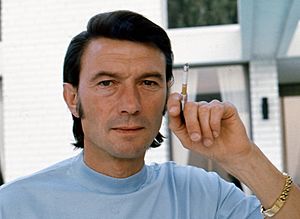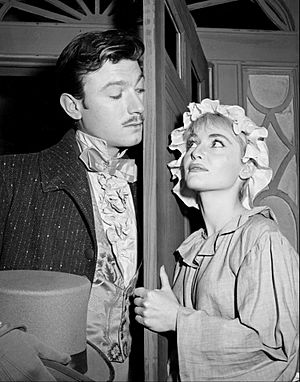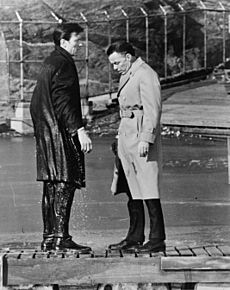Laurence Harvey facts for kids
Quick facts for kids
Laurence Harvey
|
|
|---|---|

Harvey in 1973,
photograph by Allan Warren |
|
| Born |
Zvi Mosheh Skikne
1 October 1928 Joniškis, Lithuania
|
| Died | 25 November 1973 (aged 45) |
| Resting place | Santa Barbara Cemetery, Santa Barbara, California, U.S. |
| Other names |
|
| Occupation |
|
| Years active | 1948–1973 |
| Spouse(s) |
Joan Perry
(m. 1968; div. 1972)Paulene Stone
(m. 1972) |
| Children | Domino Harvey |
Laurence Harvey (born Zvi Mosheh Skikne; 1 October 1928 – 25 November 1973) was a talented actor and film director from Lithuania. He was born to a Lithuanian Jewish family and moved to South Africa when he was very young. Later, after World War II, he settled in the United Kingdom. Over 25 years, Harvey acted in plays, movies, and TV shows, mostly in the UK and the United States.
Harvey was known for his clear, formal way of speaking and his cool, stylish on-screen personality. His acting in the movie Room at the Top (1959) earned him a nomination for an Academy Award. After this success, he played William Barret Travis in The Alamo and Weston Liggett in Butterfield 8, both released in 1960. He also famously played the brainwashed Sergeant Raymond Shaw in The Manchurian Candidate (1962). He directed his first movie, The Ceremony (1963), and kept acting until his early death in 1973.
Contents
Early Life and Moving to Britain
Growing Up in South Africa
Laurence Harvey was born in Joniškis, Lithuania. His birth name was Larushka Mischa Skikne, and his Hebrew name was Zvi Mosheh. When he was five, his family moved to South Africa. There, he was known as Harry Skikne and grew up in Johannesburg.
At just 15, Harvey auditioned for the Entertainment Unit of the South African Army during World War II. Sid James, a famous actor, managed the unit and approved his audition. They became good friends. Harvey later shared that he arrived in South Africa in 1934 and moved to the UK in 1946.
Starting His Career in London

After moving to London, he joined the Royal Academy of Dramatic Art (RADA) but left after only three months.
Using the name Larry Skikne, he acted in a play called Uprooted in 1947. He also performed at the Library Theatre in Manchester. His acting in Manchester helped him get his first movie role.
First Film and a New Name
Harvey's first movie was the British film House of Darkness (1948). However, the film's distributor thought the name Larry Skikne wasn't good for movie posters. So, he got his stage name, Laurence Harvey. One story says his agent, Gordon Harbord, thought of combining "Laurence" with "Harvey" from the store Harvey Nichols.
Becoming a Leading Actor
Working with Associated British Picture Corporation
Associated British Picture Corporation quickly offered Harvey a two-year contract, which he accepted. He played smaller roles in films like Man on the Run (1949) and Landfall (1949).
Mayflower Productions gave Harvey his first main role in the police film Cairo Road (1950), set in Egypt. This movie was a small success. He also had a small part in the Hollywood film The Black Rose (1950), starring Tyrone Power and Orson Welles. This was his first time working on a Hollywood movie.
Harvey took on leading roles in two smaller films directed by Lewis Gilbert: Scarlet Thread (1951) and There Is Another Sun (1951). He also appeared in I Believe in You (1952).
Success with Romulus Films
Harvey's career really took off when he starred in Women of Twilight (1952). This film was made by Romulus Films, run by brothers John and James Woolf. They signed Harvey to a long contract. James Woolf especially admired Harvey and helped him become a big star.
In 1953, he played Orlando in a BBC TV version of As You Like It, acting opposite Margaret Leighton, who he would later marry.
Romulus Films cast him in a comedy, Innocents in Paris (1953), and a crime thriller, The Good Die Young (1954). He had a strong role in the thriller, which also featured Hollywood actors like John Ireland and Gloria Grahame.
Harvey was offered a role in the Hollywood movie King Richard and the Crusaders (1954). He also played Romeo in Renato Castellani's film Romeo and Juliet (1954).
Romulus gave Harvey another great opportunity when he played the writer Christopher Isherwood in I Am A Camera (1955). He also made his Broadway debut in 1955 in a play called Island of Goats. While in the US, he appeared on TV in an episode of The Alcoa Hour called The Small Servant.
He was one of the soldiers in Storm Over the Nile (1955), a remake of The Four Feathers (1939). This film was popular in Britain, as was the comedy Three Men in a Boat (1956).
Becoming an International Star
Breakthrough with Room at the Top
Laurence Harvey became an international star after playing Joe Lampton in Room at the Top (1959). For this role, Harvey was nominated for a BAFTA Award and an Academy Award for Best Actor. The movie was very popular in both Britain and the U.S.
Harvey also went to Broadway in 1958 to play Henry V with the Old Vic company. He then starred in the musical film Expresso Bongo (1959). While in the US, he appeared in an episode of Alfred Hitchcock Presents called Arthur, directed by Alfred Hitchcock himself.
Hollywood Success
The success of Room at the Top led to many offers from Hollywood. Harvey decided to focus on films for the next three years. He was in John Wayne's big movie The Alamo (1960), playing Alamo commander William Barret Travis. John Wayne chose him because he was impressed by Harvey's talent. The Alamo was a hit movie.
Even more successful was his next Hollywood film, MGM's BUtterfield 8 (1960), which helped Elizabeth Taylor win her first Oscar.
Back in Britain, Harvey was cast in the film version of The Long and the Short and the Tall (1961). He also supported Shirley MacLaine in MGM's Two Loves (1961) and co-starred with Geraldine Page in Summer and Smoke (1961). At this time, he was earning around $300,000 per film.
Harvey played the main male role in Walk on the Wild Side (1962), alongside Barbara Stanwyck and Jane Fonda. Fonda later said working with him was challenging. The same year, he recorded an album of spoken poetry.
MGM cast Harvey as Wilhelm Grimm in The Wonderful World of the Brothers Grimm (1962). His performance earned him a nomination for a Golden Globe Award for Best Actor – Motion Picture Drama.
Harvey also played the brainwashed US Army Staff Sergeant Raymond Shaw in the thriller The Manchurian Candidate (1962). This film, directed by John Frankenheimer and starring Frank Sinatra, was a big hit and is one of Harvey's most famous movies.
He then went to Japan to make A Girl Named Tamiko (1962) and followed it with The Running Man (1963).
Becoming a Director
Harvey made his first movie as a director with the crime drama The Ceremony (1963), in which he also starred. It was filmed in Spain.
In 1964, Harvey played King Arthur in the London production of the musical Camelot.
He was the main male actor in Of Human Bondage (1964), co-starring Kim Novak. This was a difficult film to make, with Harvey and Novak having disagreements.
The Outrage (1964) was a remake of the Japanese film Rashomon. It starred Harvey, Paul Newman, and Claire Bloom, but it was not very successful.
Harvey played Joe Lampton again in Life at the Top (1965), which is considered one of his best later performances.
He had a commercially successful film with Darling (1965), starring Julie Christie and Dirk Bogarde. Even though Harvey's role was small, his involvement helped the director get funding for the movie.
Harvey co-starred with Israeli actress Daliah Lavi in the comedy The Spy with a Cold Nose (1966). He also appeared in The Winter's Tale (1967) and a TV movie Dial M for Murder (1967).
Later Career and Directing Again
Harvey owned the rights to a book that was partly used for the film The Charge of the Light Brigade (1968). He wanted to make his own version. As part of a legal agreement, he insisted on having a small role in the film.
Harvey finished directing the spy thriller A Dandy in Aspic (1968) after the original director, Anthony Mann, passed away. The film also starred Mia Farrow. This is often called his last important film role.
Harvey also narrated the Soviet film Tchaikovsky (1969).
He co-starred with Ann-Margret in Rebus (1969) and appeared in Kampf um Rom (1970), a film set in Ancient Rome. He also had a small role in WUSA (1970).
In 1973, he was a guest star on the TV show Columbo, playing a chess champion who commits a crime. He also appeared in an episode of Rod Serling's Night Gallery ("The Caterpillar", 1972).
Harvey starred in Escape to the Sun (1972) and was reunited with Elizabeth Taylor in Night Watch (1973). His final film, Welcome to Arrow Beach (1974), which he directed and starred in, was released after his death.
Personal Life
Laurence Harvey was married three times. His first marriage was to actress Margaret Leighton from 1957 to 1961. In 1968, he married Joan Perry, and they divorced in 1972. His third marriage was to British fashion model Paulene Stone in 1972. Their daughter, Domino Harvey, was born in 1969. Harvey also adopted Paulene's daughter from a previous marriage, Sophie.
Harvey remained good friends with Elizabeth Taylor throughout his life. She visited him shortly before he passed away. After his death, Taylor said, "He was one of the people I really loved in this world. He was part of the sun. For everyone who loved him, the sun is a bit dimmer."
Death
Laurence Harvey passed away at the age of 45 from stomach cancer in Hampstead, north London, on 25 November 1973.
His daughter, Domino Harvey, was only four years old when he died. She later became a bounty hunter and passed away in 2005. They are buried together in Santa Barbara Cemetery in Santa Barbara, California.
Awards and Nominations
- 1956 Theatre World Award
- 1959 Nomination BAFTA Award for Best British Actor
- 1960 Nomination BAFTA Award for Best British Actor
- 1959 Nomination Academy Award for Best Actor
- 1960 Nominated Laurel Award Top Male New Personality
- 1963 Nomination for Golden Globe Award for Best Actor – Motion Picture Drama
Images for kids
See also
 In Spanish: Laurence Harvey para niños
In Spanish: Laurence Harvey para niños
 | Janet Taylor Pickett |
 | Synthia Saint James |
 | Howardena Pindell |
 | Faith Ringgold |





